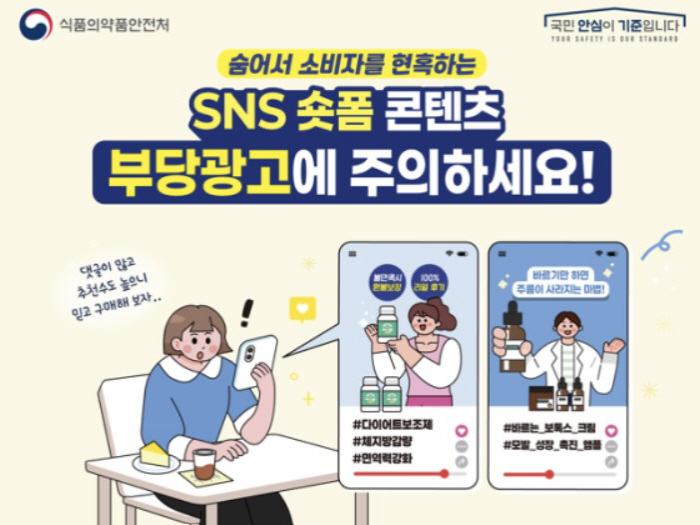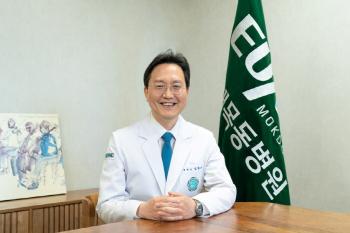Diet, strengthening immunity, hair loss...220 cases of online unfair advertising short-form contents such as food and cosmetics have been detected
Apr 21, 2025
The Ministry of Food and Drug Safety examined 225 cases of food advertised as short-form content on the social network (SNS), 100 cases of cosmetics, 147 cases of food violating the law on labeling and advertising of food such as false and excessive advertisements, and 73 cases of cosmetics violating the cosmetics law, and requested the Korea Communications Standards Commission to block access.
The Ministry of Food and Drug Safety recently conducted an intensive inspection to prevent consumer damage due to the increasing number of unfair advertisements such as stimulating experience reviews to attract consumers' attention in a short period of time" he said.
First of all, after searching for keywords of consumer interest such as #diet, #immunity enhancement, and #male and female nutritional supplements, we checked 225 short-form advertisements exposed through algorithms and found 147 unfair advertisements.
The main violations are ▲ 69 advertisements (46.9%) that confuse general food like health functional food ▲ 58 advertisements (39.5%) that may be perceived as effective or effective in preventing and treating diseases ▲ 11 false and exaggerated advertisements (7.5%), ▲ 5 advertisements (3.4%), ▲ 4 advertisements (2.7%) that may mislead or confuse food as medicine.
Examples of food inspection include advertisements that mislead and confuse ▲ general foods (enzyme foods, liquid tea, etc.) as health functional foods such as immune enhancement and antioxidation, ▲ advertisements on the efficacy and effectiveness of treating diseases such as prevention of polycystic ovary syndrome and suppression of inflammation, ▲ advertisements that are different from the facts such as raising basic metabolism, improving egg quality, shortening ovulation days, etc., ▲ advertisements that may deceive consumers by using consumer experience devices such as comparative photos before and after use, and advertisements that mislead and confuse consumers with medicines such as ▲ appetite suppressors.
In the case of cosmetics, after intensively searching keywords for products of consumer interest such as #skinrenewal, #botox, and #hair loss, we checked 100 short-form advertisements exposed through algorithms and found 73 unfair advertisements.
The main violations are ▲ 44 advertisements (60.3%), ▲ 26 advertisements (35.6%) that consumers may misinterpret or misinterpret as having an effect or effect on drugs, and ▲ 3 advertisements (4%) that are different from the contents of the review of functional cosmetics.
As an example, ▲'cell regeneration, adipocyte proliferation', 'Hair growth promotion', 'Hair loss prevention', etc. beyond the efficacy and effect of cosmetics; ▲'Human stem cell cosmetics'Human stem cell cosmetics','Filler cream','Botox treatment effect', 'N flesh becomes younger.' As expressions related to back procedures, advertisements that could be misrecognized by consumers beyond the scope of cosmetics, and misleading advertisements for functionality such as ▲ wrinkle relief and whitening were found.
The Ministry of Food and Drug Safety urged consumers to be careful not to be misled by unfair advertisements such as short-form content and purchase the product's authorization information after checking it in the Food and Drug Safety country or the Drug Safety country.
The Ministry of Food and Drug Safety recently conducted an intensive inspection to prevent consumer damage due to the increasing number of unfair advertisements such as stimulating experience reviews to attract consumers' attention in a short period of time" he said.
|
The main violations are ▲ 69 advertisements (46.9%) that confuse general food like health functional food ▲ 58 advertisements (39.5%) that may be perceived as effective or effective in preventing and treating diseases ▲ 11 false and exaggerated advertisements (7.5%), ▲ 5 advertisements (3.4%), ▲ 4 advertisements (2.7%) that may mislead or confuse food as medicine.
Examples of food inspection include advertisements that mislead and confuse ▲ general foods (enzyme foods, liquid tea, etc.) as health functional foods such as immune enhancement and antioxidation, ▲ advertisements on the efficacy and effectiveness of treating diseases such as prevention of polycystic ovary syndrome and suppression of inflammation, ▲ advertisements that are different from the facts such as raising basic metabolism, improving egg quality, shortening ovulation days, etc., ▲ advertisements that may deceive consumers by using consumer experience devices such as comparative photos before and after use, and advertisements that mislead and confuse consumers with medicines such as ▲ appetite suppressors.
In the case of cosmetics, after intensively searching keywords for products of consumer interest such as #skinrenewal, #botox, and #hair loss, we checked 100 short-form advertisements exposed through algorithms and found 73 unfair advertisements.
The main violations are ▲ 44 advertisements (60.3%), ▲ 26 advertisements (35.6%) that consumers may misinterpret or misinterpret as having an effect or effect on drugs, and ▲ 3 advertisements (4%) that are different from the contents of the review of functional cosmetics.
As an example, ▲'cell regeneration, adipocyte proliferation', 'Hair growth promotion', 'Hair loss prevention', etc. beyond the efficacy and effect of cosmetics; ▲'Human stem cell cosmetics'Human stem cell cosmetics','Filler cream','Botox treatment effect', 'N flesh becomes younger.' As expressions related to back procedures, advertisements that could be misrecognized by consumers beyond the scope of cosmetics, and misleading advertisements for functionality such as ▲ wrinkle relief and whitening were found.
The Ministry of Food and Drug Safety urged consumers to be careful not to be misled by unfair advertisements such as short-form content and purchase the product's authorization information after checking it in the Food and Drug Safety country or the Drug Safety country.
This article was translated by Naver AI translator.














